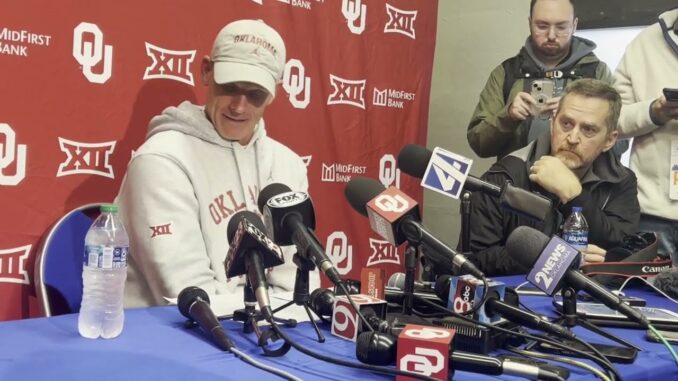
As the sun set on a season filled with high hopes and challenging realities, Brent Venables stood before the cameras, his eyes glistening with emotion.
The head coach of the Oklahoma Sooners had just delivered a heartfelt farewell, marking a pivotal moment in the program’s storied history.
“The Oklahoma Sooners have made several offensive attempts to reclaim their place at the pinnacle of college football,” he said, his voice wavering. This farewell was not just about one man’s departure; it encapsulated the struggles, the victories, and the ever-present quest for excellence that define Oklahoma football.
Oklahoma football has long been synonymous with success. From the days of Barry Switzer to the recent legacy of Lincoln Riley, the Sooners have cultivated a culture of winning that is deeply embedded in the university’s identity. When Brent Venables returned to Oklahoma as head coach, he brought with him a wealth of experience and a fierce commitment to excellence. Yet, he also inherited a program in transition, facing mounting pressures to perform in an increasingly competitive landscape.
Venables’ return to Oklahoma was met with optimism. As a former defensive coordinator under Bob Stoops, he understood the intricacies of the program and its unique culture. Fans believed he would be the catalyst for a new era, one that would blend offensive fireworks with defensive solidity. However, the journey proved to be more complex than anyone anticipated.
Throughout the season, the Sooners struggled offensively, falling short of the high standards set by their predecessors. The team’s inability to consistently move the ball and score points became a defining theme of the year. Venables, known for his defensive acumen, recognized that success in college football hinges on a well-balanced attack—something the Sooners failed to achieve. “We’ve made several offensive attempts to find our rhythm, to discover what works best for our players, but it hasn’t come together as we envisioned,” he admitted, tears welling in his eyes.
In the press conference following the final game of the season, Venables detailed the challenges faced by the offensive unit. Injuries, inconsistencies, and a lack of cohesion plagued the squad, leaving them struggling to find their identity. This was not merely a matter of poor execution; it was a fundamental struggle to adapt to the changing dynamics of college football, where offensive schemes are evolving rapidly.
Venables’ emotional goodbye was a poignant reminder of the personal stakes involved in coaching at a storied program like Oklahoma. It’s not just about wins and losses; it’s about the relationships forged with players, staff, and the community. “This program means everything to me,” he said, pausing to collect his thoughts. “We’ve built something special here, even if it didn’t manifest in the way we hoped this season.”
As the Sooners prepare for a future without Venables at the helm, the question looms: what does the next chapter look like? The challenges of the past season may serve as a catalyst for growth, prompting a reevaluation of strategies and an infusion of fresh ideas. The need for a cohesive offensive plan that capitalizes on the strengths of the roster has never been more pressing.
With Brent Venables bidding farewell, the Sooners face a critical juncture. The upcoming offseason presents an opportunity for reflection and renewal. The search for a new head coach will undoubtedly focus on finding someone who can navigate the complexities of the modern college football landscape while honoring the rich traditions of Oklahoma football.
In the interim, the program must assess its current roster and recruiting strategy. The talent pool in college football is deeper than ever, and success hinges on attracting and developing players who fit the desired system. This will require a comprehensive approach that prioritizes both offensive innovation and defensive strength—two elements that are essential for achieving championship aspirations.
Change can be daunting, especially in a program with a proud history like Oklahoma. However, it can also be a catalyst for growth and reinvention. As the Sooners move forward, embracing new ideas and adapting to the evolving game will be crucial. “We’ve learned a lot this season,” Venables reflected. “And I truly believe the foundation we’ve laid will serve this program well in the years to come.”
Venables’ departure also opens the door for potential candidates who may bring fresh perspectives and strategies to the table. The college football landscape is littered with examples of programs that have thrived after embracing change, and Oklahoma is well-positioned to do the same.
One of the most compelling aspects of Oklahoma football is its passionate fanbase. The Sooner faithful have weathered ups and downs over the years, but their unwavering support remains a cornerstone of the program. As Venables wrapped up his farewell address, he expressed gratitude for the fans, recognizing the pivotal role they play in the team’s journey. “Thank you for believing in us, even when things didn’t go according to plan,” he said. “Your support means everything.”
The bond between the program and its supporters is not just a facet of sports; it’s a cultural touchstone that connects generations. As the Sooners look to the future, fostering this relationship will be key to revitalizing the program and reinvigorating the fanbase.
Brent Venables’ emotional goodbye serves as a powerful reminder of the highs and lows of college football. While the Oklahoma Sooners faced significant challenges this season, the journey is far from over. The program stands at a crossroads, with the opportunity to learn from the past and forge a new path forward.
As the Sooners prepare for their next chapter, they carry with them the lessons learned during Venables’ tenure. The quest for offensive prowess and defensive stability will continue, and the legacy of Oklahoma football will persist. With a dedicated fanbase and a commitment to excellence, the Sooners are poised to rise again, ready to reclaim their place among college football’s elite.
Leave a Reply